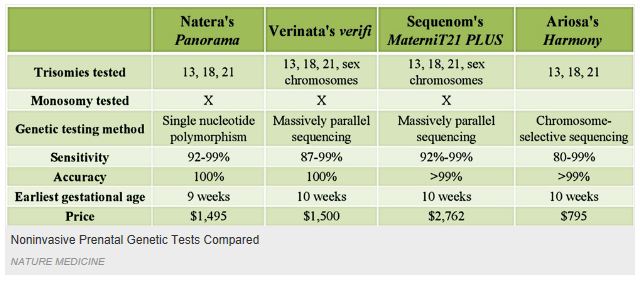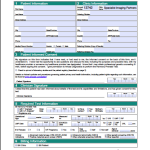

Prenatal diagnostic tests, such as amniocentesis and villocentesis, although having a diagnostic reliability of more than 99% for all fetal trisomies and aneuploidies, are highly invasive and present a potential risk to the health of the pregnant woman and the fetus (to the point of causing abortion).Īny positive result, after appropriate genetic counselling, can be confirmed by chromosomal analysis by amniocentesis. These tests can, in fact, report a positive for a fetal trisomy even if in reality we are in the presence of a pregnancy with a healthy fetus (false positive) or could report a negative for a fetal trisomy, while in fact we are in the presence of a pregnancy with a fetus affected by fetal trisomy (false negative). Prenatal screening tests of the first trimester of pregnancy, such as the measurement of nuchal translucency combined with the two biochemical markers, free-βHCG and PAPP-A, are non-invasive prenatal tests, but have a false positive rate of up to 5% and do not detect correctly up to 30% of cases of trisomy 21.

COMPARISON OF PRENATAL TESTS Advantages and limitations Il test determina il rischio di aneuploidia dei cromosomi X e Y.

Il test di cromosomi X e Y offre una precisione maggiore del 99% nella determinazione del sesso del feto. The test has a diagnostic reliability of more than 99% for trisomy 21 with a false positive rate of less than 0.1%. This allows to investigate if there is an extra copy of the chromosome analyzed. Markers identifying fetal chromosomes 13, 18, 21, X and Y are sequenced and analysed by direct analysis of the fetal DNA itself. Total DNA (fetal and maternal) is extracted from the blood, then the fetus is identified, which differs from the mother’s because it is in the form of small fragments. Numerous scientific studies have demonstrated the presence of fetal DNA in maternal blood during the entire pregnancy. The test is a combination of the latest scientific findings in the field of prenatal diagnosis and innovative molecular biology technologies. It is a safe and risk-free test for the mother and the fetus as it is performed on a simple maternal blood sample. It is a non-invasive prenatal diagnostic test that accurately detects the most common fetal trisomies, trisomy 21 or Down syndrome, trisomy 18 or Edwards syndrome, trisomy 13 or Patau syndrome, aneuploidy of the X and Y chromosomes (Turner syndrome, Klinefelter, XYY) and fetal sex from the 10th week of pregnancy until the end. US$0.0036/15 seconds (US$0.The Harmony test assesses the risk of fetal trisomy in pregnancies of 10 weeks or more and also includes the option for assessing the Y chromosome, which can provide information on the sex of the fetus. US$0.0036/15 seconds (US$0.0036 charged for a transcription shorter than 15s) The coupon is valid only in the month when it is delivered.Ġ–100,000 times/month: US$5 per thousand timesġ00,001–300,000 times/month: US$4 per thousand timesģ00,001 or more times/month: contact sales to apply for additional discounts.Ġ–100,000 times/month: US$1.5 per thousand timesġ00,001–300,000 times: US$1.2 per thousand timesĠ–100,000 times/month: US$0.25 per thousand timesġ00,001–300,000 times/month: US$0.2 per thousand timesĠ–100,000 times/month: US$7 per thousand timesġ00,001–300,000 times/month: US$5.6 per thousand timesĠ–100,000 times/month: US$3.5 per thousand timesġ00,001–300,000 times/month: US$2.8 per thousand timesĠ–100,000 times/month: US$22.5 per thousand timesġ00,001–300,000 times/month: US$18 per thousand timesĠ–100,000 times/month: US$12 per thousand timesġ00,001–300,000 times/month: US$9.6 per thousand timesĠ–100,000 times/month: US$2 per thousand timesġ00,001–300,000 times/month: US$1.6 per thousand timesģ00,001 or more times/month:contact sales to apply for additional discounts. From January 1, 2021, Huawei offers each enterprise developer with a coupon of US$300 each month, which the developer can use to pay for the usage of Location Kit, Map Kit, and Site Kit.


 0 kommentar(er)
0 kommentar(er)
